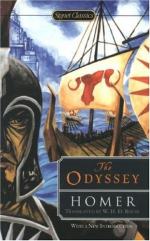Grote, although not very distinct in stating his own opinions on the subject, has done much to clearly show the incongruity of the Wolfian theory, and of Lachmann’s modifications, with the character of Peisistratus. But he has also shown, and we think with equal success, that the two questions relative to the primitive unity of these poems, or, supposing that impossible, the unison of these parts by Peisistratus, and not before his time, are essentially distinct. In short, “a man may believe the Iliad to have been put together out of pre-existing songs, without recognising the age of Peisistratus as the period of its first compilation.” The friends or literary employes of Peisistratus must have found an Iliad that was already ancient, and the silence of the Alexandrine critics respecting the Peisistratic “recension,” goes far to prove, that, among the numerous manuscripts they examined, this was either wanting, or thought unworthy of attention.
“Moreover,” he continues, “the whole tenor of the poems themselves confirms what is here remarked. There is nothing, either in the Iliad or Odyssey, which savours of modernism, applying that term to the age of Peisistratus—nothing which brings to our view the alterations brought about by two centuries, in the Greek language, the coined money, the habits of writing and reading, the despotisms and republican governments, the close military array, the improved construction of ships, the Amphiktyonic convocations, the mutual frequentation of religious festivals, the Oriental and Egyptian veins of religion, &c., familiar to the latter epoch. These alterations Onomakritus, and the other literary friends of Peisistratus, could hardly have failed to notice, even without design, had they then, for the first time, undertaken the task of piecing together many self-existent epics into one large aggregate. Everything in the two great Homeric poems, both in substance and in language, belongs to an age two or three centuries earlier than Peisistratus. Indeed, even the interpolations (or those passages which, on the best grounds, are pronounced to be such) betray no trace of the sixth century before Christ, and may well have been heard by Archilochus and Kallinus—in some cases even by Arktinus and Hesiod—as genuine Homeric matter. As far as the evidences on the case, as well internal as external, enable us to judge, we seem warranted in believing that the Iliad and Odyssey were recited substantially as they now stand (always allowing for partial divergences of text and interpolations) in 776 B.C., our first trustworthy mark of Grecian time; and this ancient date, let it be added, as it is the best-authenticated fact, so it is also the most important attribute of the Homeric poems, considered in reference to Grecian history; for they thus afford us an insight into the anti-historical character of the Greeks, enabling us to trace the subsequent forward march of the nation, and to seize instructive contrasts between their former and their later condition.”




